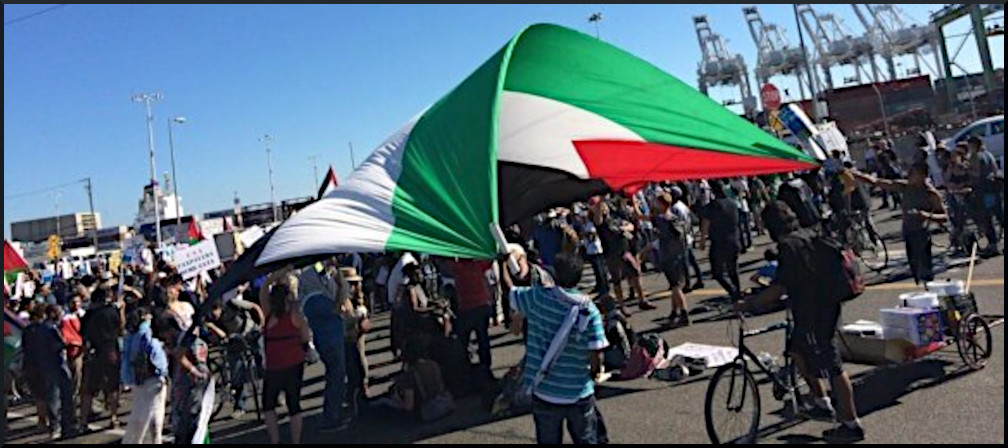by Marion Kawas, published on Mondoweiss, June 28, 2021
A small town in northern British Columbia was recently the backdrop for a chilling display of how Emirati influence and power can be used to attempt to suppress popular support for Palestine. On June 14, Prince Rupert was the scene of a Block The Boat community picket against the Israeli Zim Volans ship that had been chased away from Oakland. For a day and a half, members of ILWU 505 had respected the picket line and the Volans had sat idle. Eventually, an emergency injunction was granted, and the Volans was finally unloaded and left for Shanghai, China.
A week later, DP World, the company that handles the specific terminal in Prince Rupert Port where the Volans docked, sent out notices delivering a 3-day suspension to 94 port workers who had respected the picket. DP World stands for Dubai Ports World, and its parent company is state-owned Dubai World. DP World is a huge global enterprise that manages 78 operating terminals in over 40 countries, several of which are in Canada. There was pushback from the union and the suspensions were eventually reduced to one day recorded on their files, but the message was clear, be it in Seattle where 10 protesters were arrested or in Prince Rupert where workers were punished: Block The Boat is becoming a growing movement that has to be stopped.
So a company from the United Arab Emirates aided the Israeli Zim shipping company in trying to squash grassroots support for Palestine in a remote northern BC town, whose port is under the jurisdiction of Canada’s Minister of Transport, Arab-Canadian Omar Alghabra. A scenario that even the most creative writer could not possibly make up.
Let’s look closer at Dubai Ports World. In September 2020, it reportedly signed a deal with the Israeli company DoverTower to participate in a joint bid on the privatization of the Haifa Port. This was another one of the new “normalization” deals between the United Arab Emirates and Israel, and may potentially even involve a direct shipping line between Eilat and Dubai’s port Jebel Ali.
This is not the first time that Dubai Ports World has tried to punish workers who respected a community picket and upheld principles of solidarity. In December 2018, on Canada’s east coast, dockworkers refused to cross a picket protesting Canada’s arms sales to Saudi Arabia. According to Labour Against the Arms Trade, in that case there was also an attempt to seek “reprisals… Employer? You guessed it, DP World”.
Block The Boat BTB actions have signaled a new trend in Palestine solidarity organizing, a trend of direct action and militancy that represents the increasing frustration amongst Palestinians and their supporters dissatisfied with the failed approaches of the past. It is a trend that has been seen across the globe as new youth forces come forward to join with the voices still calling for return and liberation in Palestine.
Lara Kiswani, the Executive Director of Arab Resource & Organizing Center (AROC), explained it this way:
“The #BlockTheBoat campaign has now successfully prevented ZIM, Israel’s largest shipping company, from unloading cargo in Oakland for seven years and counting. And across the world, from South Africa to Italy to Vancouver and Prince Rupert, we have made it clear that the ZIM shipping line, and all those who do business with, profit from, or are connected to Israeli apartheid will be boycotted. Blocking ZIM, as part of the global BDS movement, is in fact isolating Israel economically, and politically.”
It is not surprising then, that repression against BTB pickets and solidarity rallies have taken on an increasingly nasty tone. Along with the police brutality in Seattle and the reprimand of workers, there was an opinion article in Newsweek entitled: “‘Block the Boat’ is a Wake-Up Call to Prioritize U.S. Port Security.” This inflammatory article even went so far as to suggest that “any protesters and longshoremen who deliberately interfere with port operations run afoul of the Hobbs Act’s definition of extortion.” And then concludes with “…federal action would send a clear message that extortionate disruption of interstate commerce by any entity will not be tolerated.”
The pro-Israel lobby and the complicit Western governments that enable Israeli apartheid have good reason to be worried. Palestine solidarity work is entering a new phase, a phase that will be based on connections with other diverse struggles and communities and will be centered around Palestinian voices that refuse to compromise or be intimidated.
*Featured Image: Protesters at the Block the Boat demonstration in Oakland harbor, 2014.
